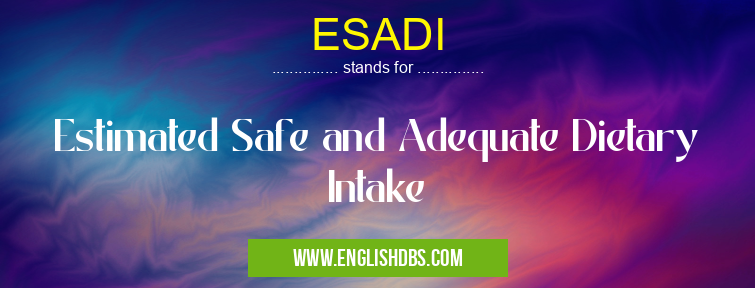What does ESADI mean in UNCLASSIFIED
ESADI stands for Estimated Safe and Adequate Dietary Intake. It is a term used to describe the recommended daily intake of nutrients that are considered safe and adequate for maintaining good health in individuals. ESADI values are established by regulatory agencies based on scientific evidence and are intended to guide individuals in planning their diets.

ESADI meaning in Unclassified in Miscellaneous
ESADI mostly used in an acronym Unclassified in Category Miscellaneous that means Estimated Safe and Adequate Dietary Intake
Shorthand: ESADI,
Full Form: Estimated Safe and Adequate Dietary Intake
For more information of "Estimated Safe and Adequate Dietary Intake", see the section below.
Importance of ESADI
ESADI values provide several significant benefits, including:
- Ensuring Nutritional Adequacy: ESADI helps individuals determine the appropriate amount of nutrients they need to consume each day to meet their bodily requirements.
- Preventing Deficiencies and Excesses: By providing recommended intake levels, ESADI helps individuals avoid both nutrient deficiencies, which can lead to health problems, and excessive intake, which can also have negative consequences.
- Informing Dietary Guidelines: ESADI values form the basis for dietary guidelines and recommendations issued by health organizations and government agencies.
Establishing ESADI Values
ESADI values are typically established through a rigorous scientific process that involves:
- Reviewing Scientific Literature: Researchers examine published studies and data to determine the relationship between nutrient intake and health outcomes.
- Assessing Individual Needs: ESADI values consider individual factors such as age, sex, physiological status, and dietary habits.
- Setting Conservative Levels: ESADI values are typically set at levels below the amount that has been proven to cause adverse effects.
Using ESADI Values
Individuals can use ESADI values to:
- Plan a Balanced Diet: ESADI values provide a framework for creating a diet that meets their nutrient needs without excessive intake.
- Identify Nutritional Deficiencies: If an individual's intake falls below the ESADI value for a particular nutrient, it may indicate a need for dietary supplementation or other interventions.
- Avoid Excessive Intake: Consuming nutrients in amounts significantly above the ESADI value may increase the risk of adverse health effects.
Essential Questions and Answers on Estimated Safe and Adequate Dietary Intake in "MISCELLANEOUS»UNFILED"
What is ESADI?
Estimated Safe and Adequate Dietary Intake (ESADI) is a term used to describe the daily intake levels of nutrients that are considered to be safe and adequate for maintaining good health. These levels are established by the Food and Nutrition Board of the Institute of Medicine based on scientific evidence and are used by healthcare professionals to make dietary recommendations.
Why are ESADIs important?
ESADIs provide guidance on the daily intake of essential nutrients needed to support the body's functions and prevent nutrient deficiencies. They help ensure that individuals consume sufficient amounts of vitamins, minerals, and other nutrients to maintain optimal health.
How are ESADIs determined?
ESADIs are determined through a rigorous process that involves reviewing scientific research on the recommended dietary intake, the bioavailability of nutrients, and the safety of different intake levels. The Food and Nutrition Board considers both the average daily intake and the upper tolerable limit for each nutrient when establishing ESADIs.
Are ESADIs the same as Recommended Dietary Allowances (RDAs)?
No, ESADIs are not the same as RDAs. RDAs represent the daily intake levels of nutrients that are considered adequate for the majority of healthy individuals in a specific population group. ESADIs, on the other hand, are broader estimates that encompass both the needs of healthy individuals and those who may have increased nutrient requirements due to factors like pregnancy, lactation, or certain health conditions.
How can I ensure I meet my ESADI requirements?
The best way to meet your ESADI requirements is to consume a balanced diet that includes a variety of nutrient-rich foods from all food groups. Fruits, vegetables, whole grains, lean protein, and dairy products are all excellent sources of essential nutrients. If you have any concerns about meeting your nutrient needs, consult with a healthcare professional or registered dietitian for personalized guidance.
Final Words: ESADI values are essential tools for ensuring adequate nutrient intake and preventing dietary deficiencies and excesses. By following ESADI guidelines, individuals can make informed dietary choices and support their overall health and well-being.
